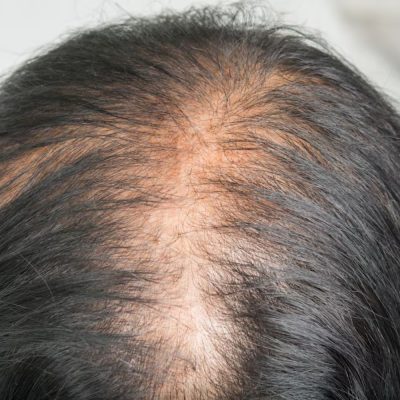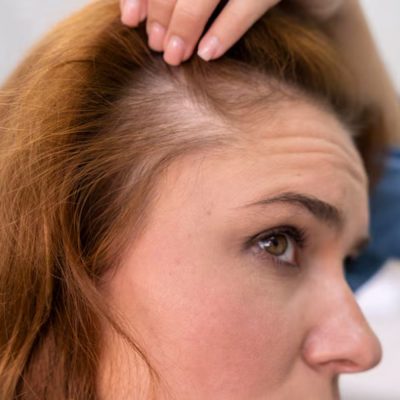Telogen Effluvium
Telogen effluvium is a common form of temporary hair loss occurring due to changes in the hair growth cycle. It can be a distressing condition, but with the right care and treatment, it is often reversible. At SkinAccess Clinics, we provide comprehensive care plans to manage your condition, helping you regain your confidence and hair health.

What is Telogen Effluvium?
Telogen effluvium is characterized by diffuse thinning or shedding of hair on the scalp. It occurs when a large number of hair follicles enter the resting (telogen) phase of the hair growth cycle simultaneously, leading to increased hair shedding. Telogen effluvium does not typically cause bald patches, but rather an overall thinning of the hair.
Symptoms of Telogen Effluvium
Telogen effluvium is typically characterized by increased hair shedding, which can be alarming to those affected. Some other common symptoms include
Diffuse Hair Thinning
Hair thinning is typically diffuse, affecting the entire scalp rather than localized areas.
Increased Hair Shedding
There may be increased hair fall when brushing, washing or handling your hair.
Noticeable Thinning
Hair may appear noticeably thinner, particularly at the crown and temples.
No Scalp Inflammation
Unlike other conditions causing hair loss, telogen effluvium does not cause scalp redness, itching or inflammation.
Causes of Telogen Effluvium
Telogen effluvium has various triggering factors that can disrupt the normal hair growth cycle.
Significant stress, either physical (surgery, childbirth, illness, etc.) or emotional (grief, anxiety, etc.) can cause hair follicles to enter into the telogen phase prematurely.
Vitamin, iron and zinc deficiencies can cause hair shedding.
Hormonal fluctuations like those experienced during thyroid disorders, pregnancy or menopause can lead to telogen effluvium.
Some medications may cause hair fall as a side effect.
Some infections, chronic illnesses or high fevers can trigger telogen effluvium.
Rapid or significant weight loss can shock the body and cause temporary hair shedding.

Diagnosis of Telogen Effluvium
Telogen effluvium is diagnosed after a thorough evaluation by a qualified dermatologist. The process of diagnosis may involve
Physical Examination
The scalp is examined to assess the pattern and extent of hair thinning.
Medical History
A detailed medical history review is performed to identify any recent stressors, illnesses or medications that may have triggered the hair loss.
Pull Test
A gentle pull test may be performed to determine the number of hairs being shed.
Blood Tests
Pathological investigations may be needed to check for any underlying conditions or nutritional deficiencies.
Scalp Biopsy
In some cases, if the diagnosis is uncertain, a scalp biopsy may be recommended to rule out other conditions.
Management and Treatment of Telogen Effluvium
Telogen effluvium is often self-limiting, with hair regrowth naturally occurring over time. However, addressing the underlying cause and properly managing the condition is essential for recovery. At SkinAccess Clinics, we offer various treatment options to help manage your condition.
➥ Addressing Underlying Causes:
- Stress Management: Practicing stress management techniques like counselling, yoga or meditation helps to reduce stress.
- Nutritional Support: A balanced diet, rich in essential vitamins and minerals is crucial. Supplements may be recommended if deficiencies are identified.
- Hormonal Balance: Treating underlying hormonal imbalances, like thyroid disorders can help restore normal hair growth.
- Medication Review: If some medications are causing side effects, consult your doctor for alternatives or adjust dosages.
➥ Topical Treatments:
- Minoxidil: Topical minoxidil helps to stimulate hair growth and reduce shedding.
➥ Lifestyle & Hair Care Modifications:
- Gentle Hair Care: Avoid the use of harsh hair products and use gentle shampoos.
- Healthy Hair Practices: Limit or avoid the use of hair styling products/ tools and chemical treatments.
➥ Supportive Therapies:
- Platelet-Rich Plasma (PRP) Therapy: PRP therapy involves injecting platelet-rich plasma into the scalp to stimulate hair growth and improve hair density.
- Low-Level Laser Therapy (LLLT): This is a non-invasive procedure involving the use of laser light to stimulate hair follicles and promote hair regrowth.
Conclusion
Telogen effluvium is a temporary condition which can be a source of significant distress to an individual. However, with the right care and treatment plan, hair typically regrows over time. If you are experiencing unexplained hair loss, SkinAccess Clinics offers expert diagnosis and personalized treatment plans to help you regain your hair’s health and vitality. Schedule a consultation with us today to learn more about managing telogen effluvium and restoring your hair’s natural beauty!
